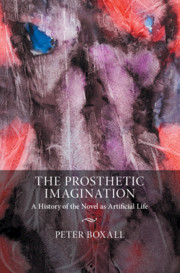Crossref Citations
This Book has been
cited by the following publications. This list is generated based on data provided by Crossref.
Allison, Anne
2021.
Automated graves: The precarity and prosthetics of caring for the dead in Japan.
International Journal of Cultural Studies,
Vol. 24,
Issue. 4,
p.
622.
Minnis, Alastair
2021.
Phantom Pains and Prosthetic Narratives.
Reznicek, Matthew L.
2022.
Life, Death, and Consciousness in the Long Nineteenth Century.
p.
119.
2023.
Being Dead Otherwise.
p.
191.
2023.
Being Dead Otherwise.
p.
73.
2023.
Being Dead Otherwise.
p.
99.
2023.
Being Dead Otherwise.
p.
215.
2023.
Being Dead Otherwise.
p.
149.
2023.
Being Dead Otherwise.
p.
1.
2023.
Being Dead Otherwise.
p.
47.
2023.
Being Dead Otherwise.
p.
173.
Class, Monika
2023.
Introducing Trace as an Embodied Approach to the Novel in English.
English Studies,
Vol. 104,
Issue. 4,
p.
579.
Baker, William
2023.
XVIIIBibliography, Textual Criticism, and Reference Works.
The Year's Work in English Studies,
Vol. 101,
Issue. 1,
p.
1339.
2023.
Being Dead Otherwise.
p.
25.
2023.
Being Dead Otherwise.
p.
197.
2023.
Being Dead Otherwise.
p.
123.
Jenkin-Smith, Daniel
2024.
Between “Engrossing” and “Penning”: Charles Lamb and the Romantic Aesthetics of Emergent Bureaucracy.
European Romantic Review,
Vol. 35,
Issue. 4,
p.
615.
Ramazani, Jahan
2024.
The Cambridge Companion to the Poem.
p.
230.
2024.
The Cambridge Companion to the Poem.
p.
211.
Duarte-Riascos, Jerónimo
2024.
Toward A Definition of the Prosthetic Condition: Mario Bellatin, Simón Hosie, and Other Ways of Inhabiting Contemporaneity.
Journal of Latin American Cultural Studies,
Vol. 33,
Issue. 3,
p.
443.



